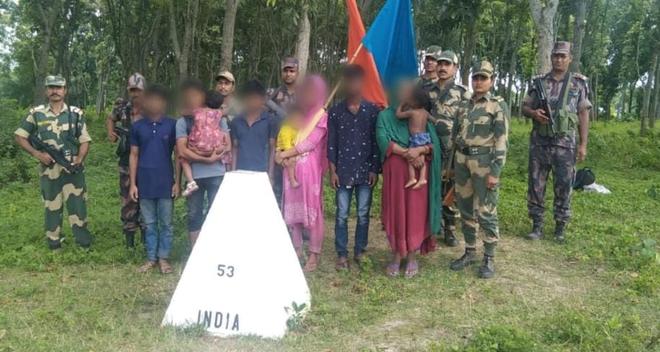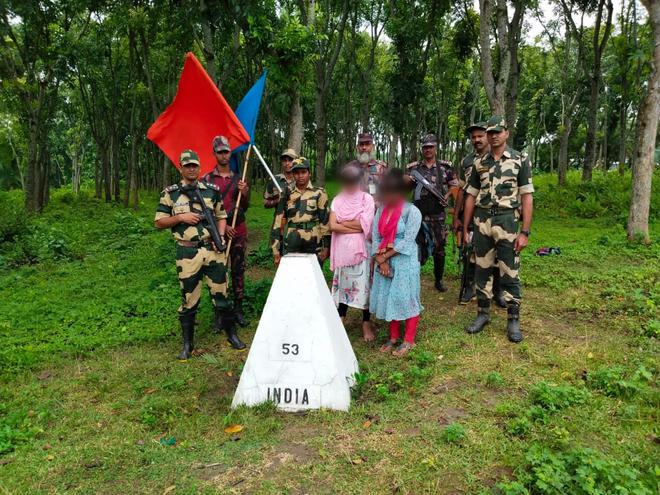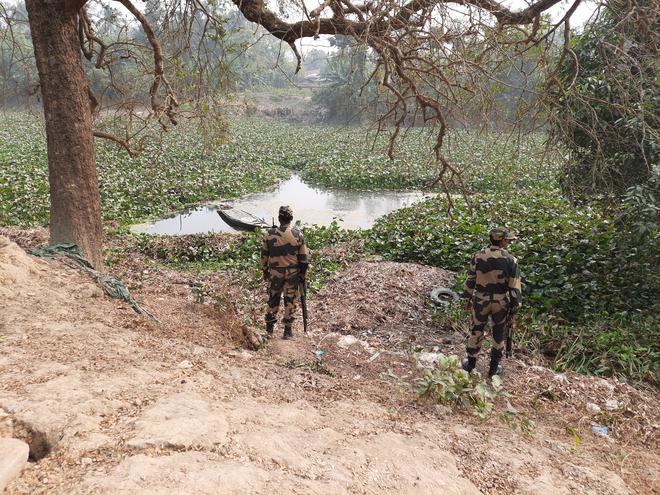On the midnight of September 23, two women, Sabana Begum (40) and Rehana Khatoon (30), were intercepted by the Border Security Force (BSF) near border outpost of Jeetpur in West Bengal’s North 24 Parganas district while illegally crossing the International Border from India to Bangladesh. Upon interrogation, they both said that they had come to India six months ago, had been working in Bengaluru, and were heading back home when they were apprehended. Similarly, on September 28, four Bangladeshi nationals were intercepted near the border outposts of Jeetpur and Ranghat, also in the same district. They also revealed that they had come to India some time ago in search of work in different cities and were returning to Bangladesh.
Following normal procedure, all the six of them would have been handed over to the police to languish in jail for several years for illegally crossing the border. They would have added to the number of foreigners already sent to West Bengal’s correctional homes. But this time, the BSF authorities, instead of handing them over to the police, arranged meetings with their counterparts in Bangladesh, the Border Guard Bangladesh (BGB), and handed them over to the Bangladeshi authorities.

With overcrowding of prisons turning out to be a major challenge for security agencies, in several cases of illegal border crossing, the BSF is not arresting those crossing the border but handing them over to the BGB , often described as a “gesture of humanity and goodwill”. Data from the South Bengal Frontier of the BSF reveals that in 2022, till October 5, the Frontier had handed over 287 persons to BGB, including 146 males, 102 females, 38 children, and one transgender person.
BSF authorities, however, insist that only those who are not involved in the smuggling of narcotics, cough syrup, fake currency, gold and other prohibited articles, are handed over to the BGB on humanitarian grounds. Many such persons cross the border are looking for work, returning home after working in India. Some of them try to sneak in to meet relatives or to avail treatment, and in some cases, it’s children who have run away from their homes.

A recent report on Prison Statistics of India-2021 shows that of the 5,565 foreign inmates lodged in the country’s correctional homes, West Bengal alone accounts for 1,746 (31% of all prisoners) hailing from foreign countries. West Bengal has reported the highest number of foreign convicts lodged in its jails (30.5% or 329 persons) and the highest number of foreign undertrials lodged in its jails (28.4% or 1,179 persons). The report also points out that among the foreign inmates, Bangladeshi nationals comprise the majority — 40.5% — of all foreign inmates. A majority of the foreign nationals were arrested for crossing the border illegally.
Thousands of persons are apprehended every year for illegally crossing the border along the BSF’s South Bengal Frontier. This frontier of the BSF guards a stretch of 913.324 km along the India-Bangladesh border, from Sunderbans in the south to Malda in the north, and is the most porous stretch of India’s borders in the entire eastern theatre. More than 40% of the border — over 360 km — is riverine, where rivers serve as boundaries between the two countries. Security agencies managing the border describe it as the most complex region with a high density of populations residing on either side of the border in close proximity, with significant ethnic and cultural similarities.
Hakimpur village in West Bengal’s North 24 Parganas district under the Swarupnagar Police Station is located on the edge of the India-Bangladesh border. A narrow waterbody, less than 50 metres wide, serves as the international border at Hakimpur. With houses on both banks and the absence of any fencing, it’s not difficult to cross a few hundred metres in knee-deep water. Every morning, BSF personnel try to look for articles floating in the water, which could help crossing from one side to other in a few seconds. Over the past few years, along with people crossing from one side to the other, BSF officials have had to deal with the challenge of a large number of shops opening up in Hakimpur village, which, with a population of 10,000 people, has 4,000-5,000 shops.

Officials of the 112 BSF battalions that guard this stretch of the border say the shops sell smuggled items of daily use from India to Bangladesh. The BSF shut down a large number of the shops. There are nine such villages under the jurisdiction of the Swarupnagar Police Station alone, which is situated ahead of what is called the BSF’s ‘Area of Operation’. The bordering area under the Bagda Police Station in the district also poses similar challenges and it’s not difficult to cross the international border there.
In 2021, the BSF’s South Bengal Frontier arrested 2,036 Bangladeshi nationals and 860 Indian nationals for illegally crossing the border. Contrary to public perception, more arrests are made while Bangladeshi nationals are crossing back to Bangladesh from India rather than while crossing from Bangladesh to India.
According to officials of West Bengal’s correctional homes, other than convicts and undertrials, many Bangladeshi nationals are still languishing in prisons after completing their term. This is because the deportation of such prisoners, often referred to as “ jaan khalash” (having completed the term) in the prison records is a lengthy process involving both countries. The prison occupancy rate in West Bengal according to Prison Statistics of India-2021 stands at 120. Occupancy rate is defined as the number of inmates staying in jails with the authorised capacity for 100 inmates.







